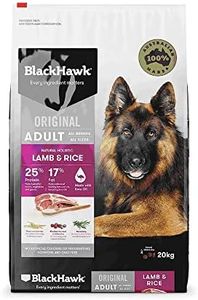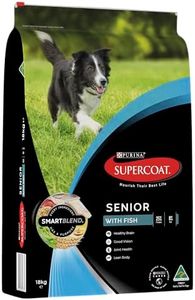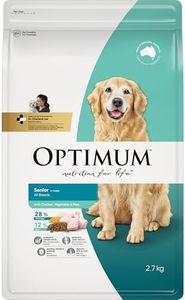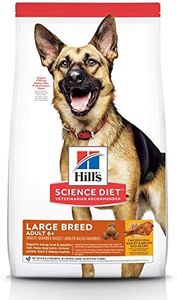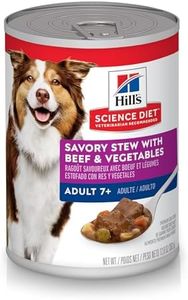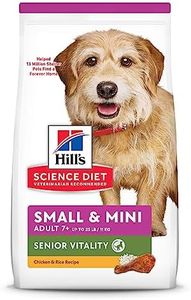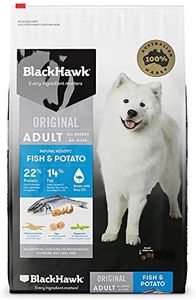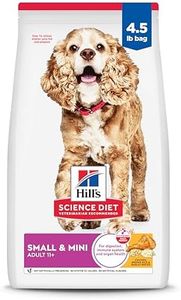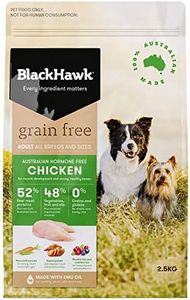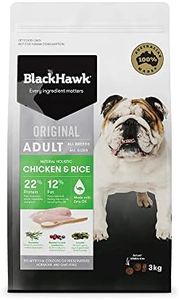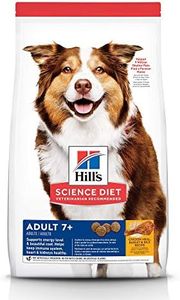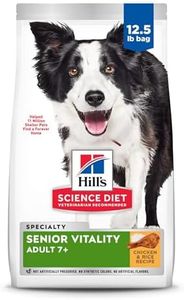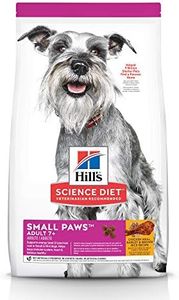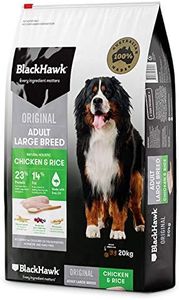We Use CookiesWe use cookies to enhance the security, performance,
functionality and for analytical and promotional activities. By continuing to browse this site you
are agreeing to our privacy policy
10 Best Senior Dog Foods
From leading brands and best sellers available on the web.By clicking on a link to a third party's website, log data is shared with that third party.
Buying Guide for the Best Senior Dog Foods
Choosing the right food for your senior dog is crucial because their nutritional needs change as they age. Older dogs often require special diets to support joint health, weight management, and overall vitality. When selecting senior dog food, it’s important to understand what key ingredients and nutritional elements to look for. Being attentive to your dog’s specific health concerns, activity level, and any guidance from your veterinarian will help you pinpoint the best formula to keep your pet healthy and happy in their golden years.Protein ContentProtein is essential for maintaining muscle mass in senior dogs, whose muscles can naturally weaken with age. High-quality protein supports mobility and keeps them active. Typically, senior dog foods have moderate to high protein content, with options ranging from lower (18-22%) to higher (23% and above). If your dog is still quite energetic and lean, a higher protein formula may be best, while less active or overweight dogs might benefit from moderate levels. Always consider your vet’s advice and watch for changes in your dog’s muscle tone when choosing protein amounts.
Fat LevelFat provides energy and helps with the absorption of vitamins, but senior dogs often have slower metabolisms, so they may need less fat compared to younger dogs. Senior dog foods typically have fat content from about 8-14%. Lower fat options help dogs that are less active or prone to weight gain, while the higher end is suitable for senior dogs who are still very active or are struggling to maintain weight. Monitoring your dog’s weight and adjusting fat intake accordingly is essential.
Fiber ContentDietary fiber helps support digestion and can aid in weight control. Senior dogs may be more prone to constipation, so a diet with moderate fiber (around 4-8%) is often recommended. Additional fiber can help keep your dog regular and feeling full longer, which is useful if weight management is a concern. If your dog has no digestive issues, a moderate fiber level is usually sufficient; otherwise, consult with your vet if higher fiber is needed.
Joint Support IngredientsOlder dogs frequently suffer from joint problems like arthritis, so many senior dog foods include joint-supporting ingredients like glucosamine and chondroitin. While these ingredients don’t cure joint woes, they may help slow joint deterioration and relieve discomfort. If your dog seems stiff or has trouble moving, look for formulas that mention joint support. Even if your dog is currently mobile, preventative joint care can go a long way.
Caloric DensityCaloric density refers to how many calories are packed into a given amount of food. Senior dog foods are usually less calorie-dense to help prevent unwanted weight gain as your dog becomes less active. Dogs who get regular exercise may still do well with more calorie-dense food, while more sedentary dogs benefit from a diet with fewer calories per cup. Watch your dog’s weight and body condition to find the right balance.
Antioxidants and Immune SupportOlder dogs can have weakened immune systems. Ingredients like antioxidants (from sources such as vitamin E, vitamin C, and certain fruits and veggies) help boost immune function and combat the effects of aging. If your dog is generally healthy, food with some added antioxidants can help maintain that good health; if your pet is prone to illnesses, you may want to prioritize foods richer in antioxidants and immune-supporting ingredients.
Kibble Size and TextureSenior dogs often have dental issues or weaker jaws, so the size and hardness of kibble can impact their eating comfort. Some foods are specially formulated with smaller or softer kibble to make chewing easier. If your dog has missing teeth, sensitivity, or struggles to chew, look for foods labeled as easy to chew or even consider wet or soft varieties. For dogs with no dental issues, normal kibble or larger pieces can help keep teeth cleaner.
